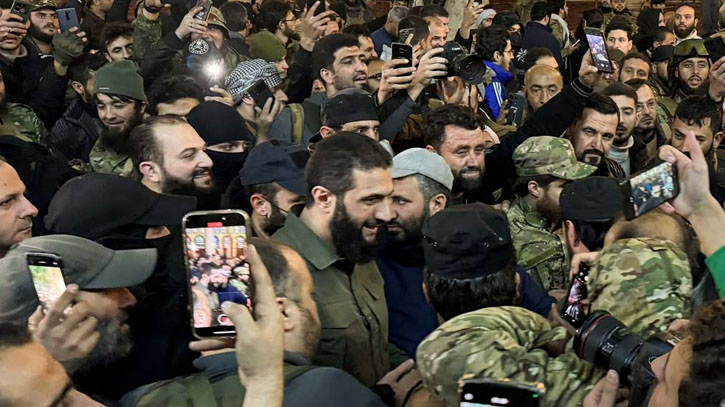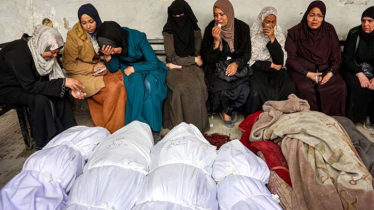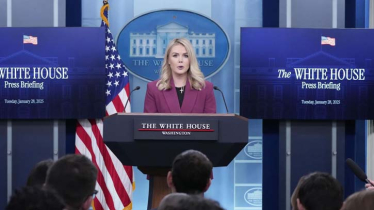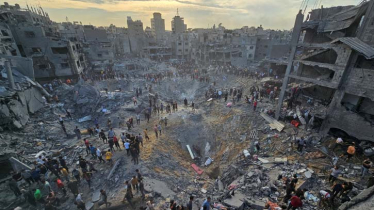
Photo: Collected
The main commander of the fighters who toppled Bashar al-Assad said on Wednesday that he would dissolve the security forces of the former regime, close its prisons and hunt down anyone involved in the torture or killing of detainees. Syrian rebel leader Ahmad al-Sharaa - better known as Abu Mohammed al-Golani - said in a statement to Reuters he will ,dissolve the security forces of the previous regime and close the notorious prisons.
Syria ran one of the most oppressive police states in the Middle East during five decades of Assad family rule. Sharaa, whose former al Qaeda affiliate Hayat Tahrir al-Sham (HTS) is now the country's most powerful force, must balance demands for justice from victims with the need to prevent violent reprisals and secure international aid.
Syrians have flocked to the infamous prisons where the Assad regime is estimated to have held tens of thousands of detainees, desperately looking for their loved ones. Some have been released alive, others were identified among the dead and thousands more have not yet been found.
Sharaa said in a separate statement on the Syrian state TV's Telegram channel that people who took part in the torture or killing of detainees would be hunted down, and pardons were out of the question.
"We will pursue them in Syria, and we ask countries to hand over those who fled so we can achieve justice," said Sharaa. The world is carefully watching to see if Syria's new rulers can stabilise the country and avoid unleashing violent revenge, after a 13-year civil war fought along sectarian and ethnic lines.
Since Assad's fall, 27-year-old Hayat al-Turki has been searching the abandoned cells of Syria's most notorious prison, the vast Sednaya complex, for any sign of her missing relatives, including her brother who vanished 14 years ago.
"I was hopeful and optimistic to find someone from my missing prisoners - a brother, an uncle or a cousin - but I did not... I searched the whole prison," she said. Mohammad al-Bashir, the man installed by Sharaa's fighters to lead an interim administration until March, said he aimed to bring back millions of refugees, create unity and provide basic services.
But the new administration has scant resources, he told Italian newspaper Il Corriere della Sera. "We have no foreign currency and as for loans and bonds we are still collecting data. So yes, financially we are very bad," said Bashir, who previously ran a small rebel-led administration in a pocket of northwestern Syria.
Rebuilding Syria is a colossal task following the civil war that killed hundreds of thousands of people, reduced cities to ruins and left the economy gutted by international sanctions. Millions of refugees still live in camps after one of the biggest displacements of modern times.
Foreign officials are warily engaging with the former rebels, although HTS remains designated a terrorist organisation by Washington, the United Nations, EU and others. The new government must "uphold clear commitments to fully respect the rights of minorities, facilitate the flow of humanitarian assistance to all in need, prevent Syria from being used as a base for terrorism or posing a threat to its neighbours," US Secretary of State Antony Blinken said.
US Deputy National Security Adviser Jon Finer told Reuters Washington remains cautious. "We have seen over the years any number of militant groups who have promised that they would govern in an inclusive way, and then see them fail to meet those promises," State Department spokesperson Matthew Miller said.
In addition to terrorism bans in place against the former rebels, Syria also remains under US, European and other financial sanctions imposed against Damascus under Assad.
Two senior US congressmen, a Republican and a Democrat, wrote a letter calling for Washington to suspend some sanctions. The most punishing war-time US sanctions are up for renewal this month, and the former rebels have told Reuters they are in touch with Washington about potentially easing them.
Spain's Foreign Minister Jose Luis Albares on Wednesday said at the Reuters NEXT conference that he expected the UN and European Union to discuss easing sanctions and removing HTS from lists of terrorist organisations.
The international community must quickly demand that the rebel forces transform into a political movement and respect human rights, he added. "We must move very fast because in a month, probably, decisions will have already been taken in Damascus and we will not be able to have the impact that we can have today," Albares said.
With the administration of US President Joe Biden entering its final weeks in office, Blinken and US national security adviser Jake Sullivan headed to the Middle East on Wednesday to work on a Gaza ceasefire and help ensure a smooth transition in Syria, US officials said. Their separate itineraries include stops in Jordan, Turkey, Israel, Qatar and Egypt.
For refugees, the prospect of returning home has brought a mixture of joy and grief over hardship in exile. Syrians lined up at the Turkish border on Wednesday to head home, speaking of their expectations for a better life following what was for many a decade of hardship in Turkey.
"We have no one here. We are going back to Latakia, where we have family," said Mustafa as he prepared to enter Syria with his wife and three sons at the Cilvegozu border gate in southern Turkey. Dozens more Syrians were waiting to cross.
Messenger/JRTarek








